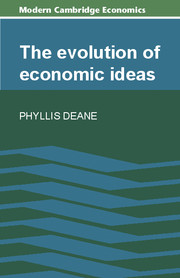Book contents
- Frontmatter
- Series preface
- Contents
- Introduction
- 1 Origins of modern economics
- 2 Adam Smith's theory of value
- 3 Origins of modern growth theory
- 4 Classical monetary theory
- 5 Ricardo on value, distribution and growth
- 6 Scope and methodology of classical political economy
- 7 The marginal revolution and the neo-classical triumph
- 8 The neo-classical theory of value
- 9 The Marxian alternative
- 10 Neo-classical orthodoxy in the inter-war period
- 11 Monetary theory in the neo-classical era
- 12 The Keynesian revolution
- 13 Twentieth-century growth theory
- 14 Methodological divisions in economics since Keynes
- Index of names
- Subject index
10 - Neo-classical orthodoxy in the inter-war period
Published online by Cambridge University Press: 05 June 2012
- Frontmatter
- Series preface
- Contents
- Introduction
- 1 Origins of modern economics
- 2 Adam Smith's theory of value
- 3 Origins of modern growth theory
- 4 Classical monetary theory
- 5 Ricardo on value, distribution and growth
- 6 Scope and methodology of classical political economy
- 7 The marginal revolution and the neo-classical triumph
- 8 The neo-classical theory of value
- 9 The Marxian alternative
- 10 Neo-classical orthodoxy in the inter-war period
- 11 Monetary theory in the neo-classical era
- 12 The Keynesian revolution
- 13 Twentieth-century growth theory
- 14 Methodological divisions in economics since Keynes
- Index of names
- Subject index
Summary
It is the function of an economic theory to bring some aspects of reality sharply into focus at the expense of making simplifying assumptions that are patently untrue of the real world. Classical and neo-classical theory, for example, assumed an unchanging political and social environment and by so doing made it easier to isolate the inter-connections between the distinctively economic factors in the economic process. Walrasian general equilibrium theory exploited mathematical tools of analysis to illuminate the overall interdependence of commodity and factor markets, but could be applied to the study of the real world only on the assumption that most of the inter-relationships were constant. The Marshallian partial equilibrium analysis made the stability assumptions less crucial by focusing on the behaviour of the micro-units in the economic system (the individual consumer or firm) and through the additional assumption of the ‘representative firm’ sought to extend its scope to cover the market situations of whole industries.
The neo-classical framework of analysis defined in Marshall's Principles of Economics (1890) established the main foundation of orthodox economic thought for roughly half a century after its publication. The scientific community of economists reared in this tradition found themselves endowed with an integrated set of theories and tools of analysis which were useful and flexible over a wide range of currently interesting problems. There was a lot for them to do both in applying the techniques to current problems and in tying up loose ends in the theory.
- Type
- Chapter
- Information
- The Evolution of Economic Ideas , pp. 143 - 162Publisher: Cambridge University PressPrint publication year: 1978



